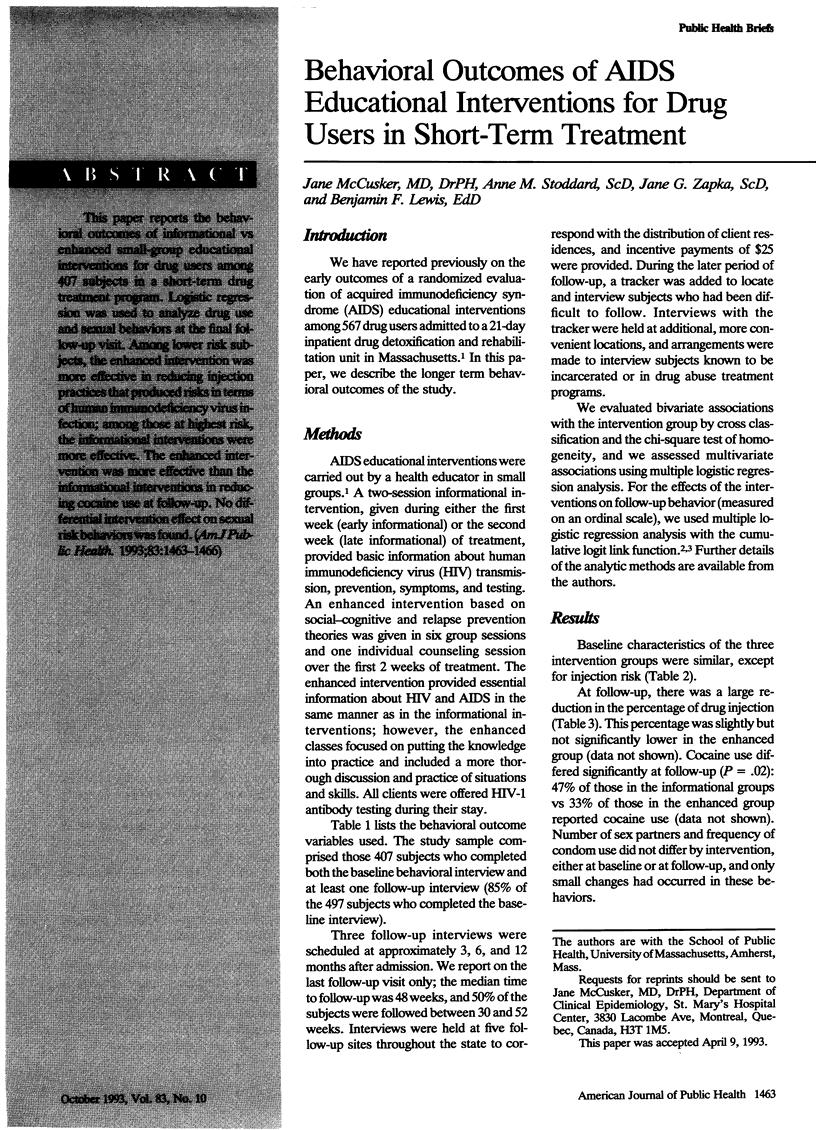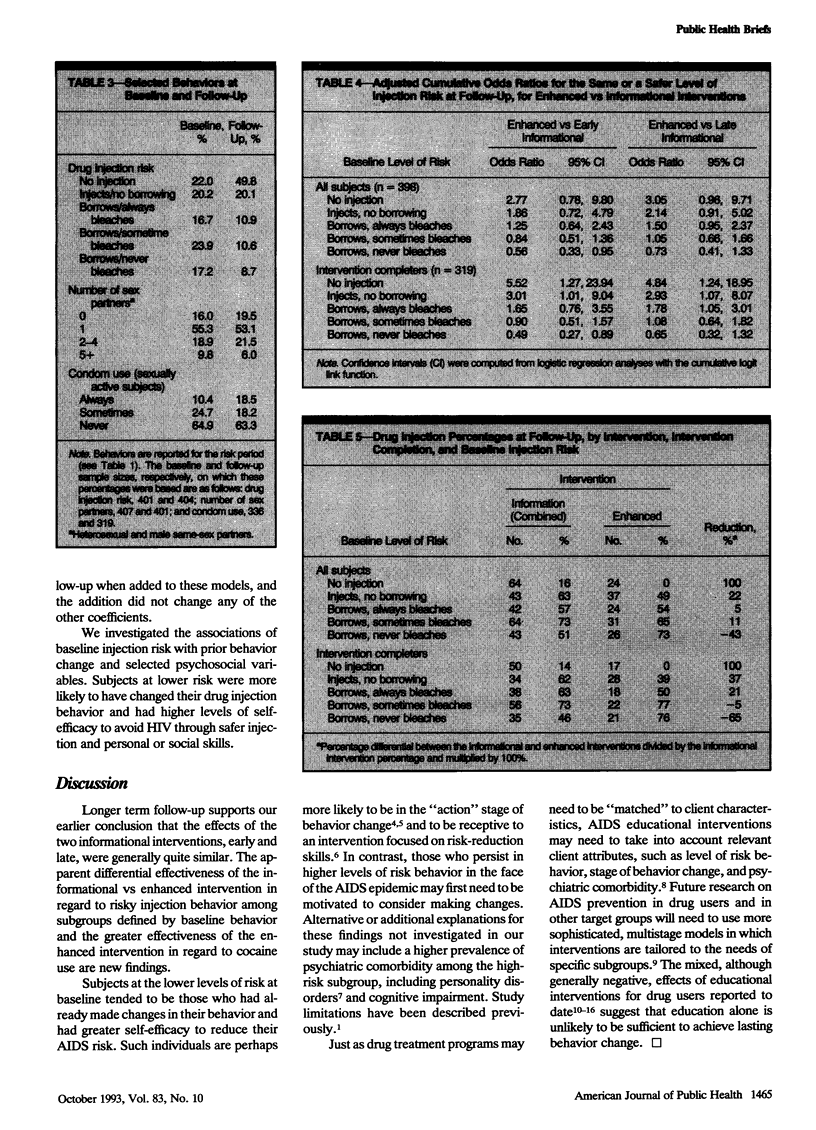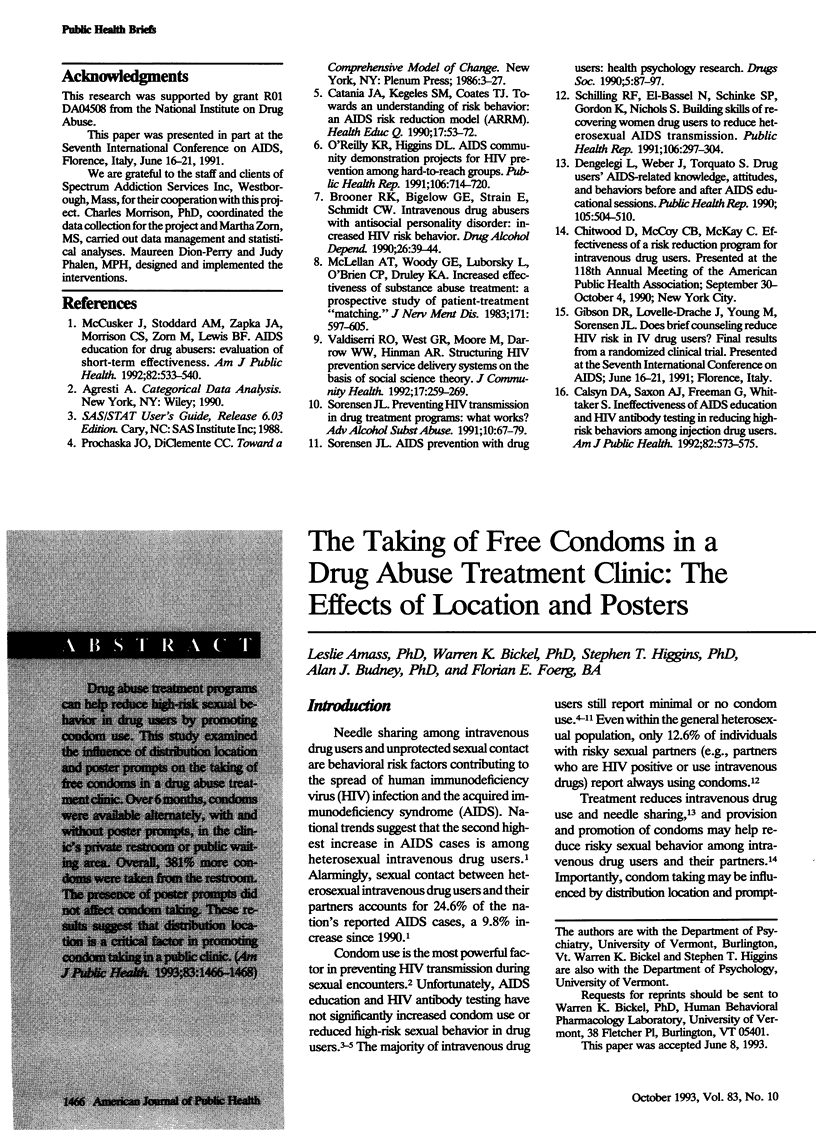Abstract
This paper reports the behavioral outcomes of informational vs enhanced small-group educational interventions for drug users among 407 subjects in a short-term drug treatment program. Logistic regression was used to analyze drug use and sexual behaviors at the final follow-up visit. Among lower risk subjects, the enhanced intervention was more effective in reducing injection practices that produced risks in terms of human immunodeficiency virus infection; among those at highest risk, the informational interventions were more effective. The enhanced intervention was more effective than the informational interventions in reducing cocaine use at follow-up. No differential intervention effect on sexual risk behaviors was found.
Full text
PDF



Selected References
These references are in PubMed. This may not be the complete list of references from this article.
- Brooner R. K., Bigelow G. E., Strain E., Schmidt C. W. Intravenous drug abusers with antisocial personality disorder: increased HIV risk behavior. Drug Alcohol Depend. 1990 Aug;26(1):39–44. doi: 10.1016/0376-8716(90)90081-o. [DOI] [PubMed] [Google Scholar]
- Calsyn D. A., Saxon A. J., Freeman G., Jr, Whittaker S. Ineffectiveness of AIDS education and HIV antibody testing in reducing high-risk behaviors among injection drug users. Am J Public Health. 1992 Apr;82(4):573–575. doi: 10.2105/ajph.82.4.573. [DOI] [PMC free article] [PubMed] [Google Scholar]
- Catania J. A., Kegeles S. M., Coates T. J. Towards an understanding of risk behavior: an AIDS risk reduction model (ARRM). Health Educ Q. 1990 Spring;17(1):53–72. doi: 10.1177/109019819001700107. [DOI] [PubMed] [Google Scholar]
- Dengelegi L., Weber J., Torquato S. Drug users' AIDS-related knowledge, attitudes, and behaviors before and after AIDS education sessions. Public Health Rep. 1990 Sep-Oct;105(5):504–510. [PMC free article] [PubMed] [Google Scholar]
- McCusker J., Stoddard A. M., Zapka J. G., Morrison C. S., Zorn M., Lewis B. F. AIDS education for drug abusers: evaluation of short-term effectiveness. Am J Public Health. 1992 Apr;82(4):533–540. doi: 10.2105/ajph.82.4.533. [DOI] [PMC free article] [PubMed] [Google Scholar]
- McLellan A. T., Woody G. E., Luborsky L., O'Brien C. P., Druley K. A. Increased effectiveness of substance abuse treatment. A prospective study of patient-treatment "matching". J Nerv Ment Dis. 1983 Oct;171(10):597–605. doi: 10.1097/00005053-198310000-00002. [DOI] [PubMed] [Google Scholar]
- O'Reilly K. R., Higgins D. L. AIDS Community Demonstration Projects for HIV prevention among hard-to-reach groups. Public Health Rep. 1991 Nov-Dec;106(6):714–720. [PMC free article] [PubMed] [Google Scholar]
- Schilling R. F., el-Bassel N., Schinke S. P., Gordon K., Nichols S. Building skills of recovering women drug users to reduce heterosexual AIDS transmission. Public Health Rep. 1991 May-Jun;106(3):297–304. [PMC free article] [PubMed] [Google Scholar]
- Sorensen J. L. Preventing HIV transmission in drug treatment programs: what works? J Addict Dis. 1991;10(4):67–79. doi: 10.1300/J069v10n04_05. [DOI] [PubMed] [Google Scholar]
- Valdiserri R. O., West G. R., Moore M., Darrow W. W., Hinman A. R. Structuring HIV prevention service delivery systems on the basis of social science theory. J Community Health. 1992 Oct;17(5):259–269. doi: 10.1007/BF01324356. [DOI] [PubMed] [Google Scholar]


